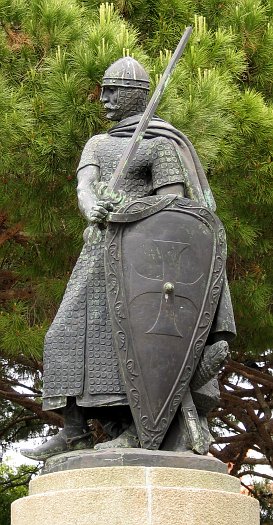Afonso I of Portugal facts for kids
Quick facts for kids Afonso I of Portugal |
|
|---|---|
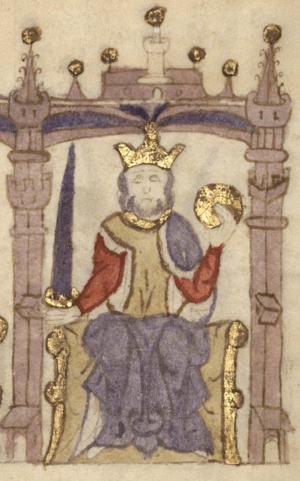
Portrait in Compendium of Chronicles of Kings (c. 1312–25)
|
|
| King of Portugal | |
| Reign | 26 July 1139 – 6 December 1185 |
| Acclamation | 25 July 1139 |
| Successor | Sancho I |
| Count of Portugal | |
| Reign | 24 June 1128 – 25 July 1139 |
| Predecessor | Teresa |
| Born | Afonso Henriques Disputed: 1106, 25 July 1109, August 1109 or 1111 Disputed: Guimarães or Viseu |
| Died | 6 December 1185 (aged 73–74, 76 or 78–79) Coimbra, Portugal |
| Burial | Santa Cruz Monastery, Coimbra |
| Spouse | Mafalda of Savoy |
| Issue among others ... |
(ill.) Fernando Afonso Urraca, Queen of León Teresa, Countess of Flanders Mafalda Sancho I, King of Portugal (ill.) Urraca, 1st Lady of Avô and Aveiro |
| House | Portuguese House of Burgundy |
| Father | Henry, Count of Portugal |
| Mother | Teresa, Countess of Portugal |
| Religion | Catholic |
Afonso I of Portugal (born around 1106 or 1109; died 1185) was also known as Afonso Henriques. People called him the Conqueror because he won many battles. The Moors, who were his enemies, called him El-Bortukali (meaning "the Portuguese").
Afonso I was the very first king of Portugal. He made the County of Portugal an independent country. He also doubled its size by fighting against the Moors in a long period called the Reconquista. He worked towards this goal until he died.
Afonso was the son of Teresa of León and Henry of Burgundy. They were the rulers of the County of Portugal. When Henry died in 1112, Teresa ruled alone. Some Portuguese nobles were unhappy with Teresa's close relationship with Fernando Pérez de Traba from Galicia. They felt he had too much political power.
So, the nobles supported young Afonso. He led a revolt and defeated his mother at the Battle of São Mamede in 1128. After this, he became the Count of Portugal. In 1139, Afonso declared Portugal independent from the Kingdom of León. This created the new Kingdom of Portugal.
Afonso fought many battles against the Moors in the south. In 1139, he won a big victory at the Battle of Ourique. In 1147, he captured Santarém and Lisbon from the Moors. He got help from crusaders who were on their way to the Holy Land for the Second Crusade.
He made sure Portugal's independence was secure after winning a battle against León at Valdevez. The Pope also officially recognized Portugal as a kingdom through a document called Manifestis Probatum. Afonso died in 1185, and his son, Sancho I, became the next king.
Contents
Early Life and Challenges
Afonso was the son of Teresa and Henry of Burgundy. Teresa was the daughter of King Alfonso VI of León and Castile. Afonso was likely born in Guimarães, which was an important city at the time. Some historians suggest he might have been born in Coimbra or Viseu.
His father, Henry, died in 1112 during a battle. After his death, Afonso's mother, Teresa, ruled Portugal by herself. She even called herself queen for a while. However, she was later forced to accept that she was still under the rule of her half-sister, Urraca of León.
It is believed that Ermígio Moniz was Afonso's tutor. He was a close advisor to Afonso in his early years as count.
A Young Leader Emerges
Afonso's mother, Teresa, formed an alliance with Fernando Pérez de Trava, a powerful count from Galicia. Many Portuguese nobles did not like this alliance. They gathered around Afonso, hoping for more independence for Portugal. The Archbishop of Braga also worried about Galicia's growing power.
To stop her son, Teresa sent Afonso away in 1120 when he was twelve. In 1122, Afonso turned fourteen, which was considered an adult age back then. In 1125, he became a knight in the Cathedral of Zamora. After a military campaign by his cousin, Alfonso VII of León and Castile, against Teresa, Afonso revolted. He took control of the county from his mother.
Becoming the Sole Ruler
In 1128, Afonso and his supporters fought his mother's troops at the Battle of São Mamede, near Guimarães. Afonso won and sent his mother away to Galicia. He then became the sole ruler of the County of Portucale. This battle was important because it stopped Portugal from being joined with Galicia. It also showed that the nobles and church wanted more independence.
The King of León, Afonso VII, was busy with other problems. He did not immediately react to Afonso taking control. On April 6, 1129, Afonso Henriques declared himself the Prince of Portugal. This was seen as his right because he was a grandson of the "Emperor of Hispania."
The Path to Kingship
Afonso then focused on fighting the Moors in the south. His military campaigns were very successful. On July 25, 1139, he won a huge victory at the Battle of Ourique. Right after this battle, his soldiers proclaimed him King of the Portuguese. This made him equal in rank to other rulers in the Iberian Peninsula.
However, Portugal still needed to be recognized as a kingdom by other countries. Most importantly, it needed recognition from the Catholic Church and the pope. Afonso married Mafalda of Savoy, the daughter of a powerful count. He also sent messengers to Rome to talk with the pope.
He managed to declare himself a direct liege man of the papacy. This meant he was a vassal of the pope, not of the King of León. This was a smart move, similar to what the kings of Sicily and Aragon had done.
Portugal's Independence and Growth
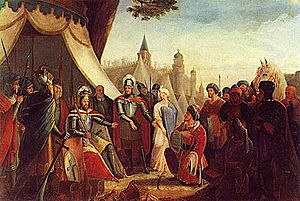
Afonso built many monasteries and convents in Portugal. He gave special rights to religious groups. He is famous for building the Alcobaça Monastery. He invited the Cistercian Order to live there. In 1143, he wrote to Pope Innocent II. He promised that Portugal would serve the church and fight to remove the Moors from the Iberian Peninsula.
Afonso continued to fight bravely against the Moors. He captured Santarém and Lisbon in 1147. He also took control of a large area south of the Tagus River. However, some of this land was lost back to the Moors later.
Securing Peace and Recognition
King Alfonso VII of León still saw Afonso as a rebel. There were constant conflicts between them. Afonso joined forces with the King of Aragon, who was an enemy of Castile. To strengthen this alliance, Afonso's son Sancho was engaged to Dulce of Aragon.
Finally, after winning the Battle of Valdevez, the Treaty of Zamora was signed in 1143. This treaty brought peace between Afonso and his cousin. It also officially recognized Portugal as a fully independent kingdom.
In 1169, King Afonso was injured near Badajoz. He fell from his horse and was captured by the soldiers of King Ferdinand II of León, who was his son-in-law. Afonso spent months recovering, but he never rode a horse again. As part of his ransom, Portugal had to give up almost all the lands Afonso had conquered in Galicia. This event is known as the Disaster of Badajoz.
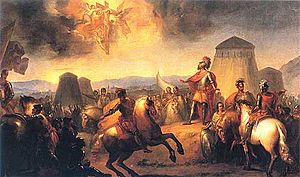
In 1179, the Catholic Church rewarded Afonso for his loyalty. After much effort, especially from the Archbishop of Braga, Paio Mendes, the pope issued a special document. This document, called Manifestis Probatum, officially recognized Afonso as king. It also declared Portugal an independent kingdom. The pope even gave Portugal the right to conquer more lands from the Moors.
In 1184, a large Moorish army attacked Santarém. Afonso's son, Sancho, defended the city. The siege failed when news arrived that the Archbishop of Compostela and King Ferdinand II of León were coming to help. The Moors retreated in a panic, and their leader was injured and died. Afonso died shortly after, on December 6, 1185.
Portuguese people see Afonso as a great hero. He is remembered as the founder of their nation. There are many stories about him, like how it took ten men to carry his sword. It is also said that he had a strong temper. One story tells of a papal messenger who brought a letter refusing to recognize Afonso as king. Afonso became so angry that nobles and soldiers had to hold him back.
Scientific Research on His Tomb
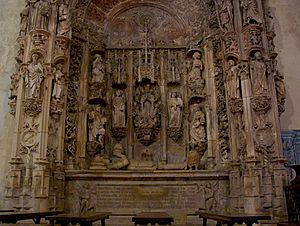
In July 2006, scientists wanted to open Afonso's tomb. His tomb is located in the Santa Cruz Monastery in Coimbra. Researchers from the University of Coimbra and the University of Granada wanted to study his remains.
However, this caused a lot of concern among the Portuguese people. The Portuguese State Agency for Architectural Patrimony stopped the opening. They asked for more detailed plans from the scientists. This shows how important King Afonso is to the history and feelings of the Portuguese nation.
Family and Descendants
In 1146, Afonso married Mafalda. She was the daughter of Amadeus III, Count of Savoy. They had several children together:
- Henry (1147–1155): Named after his grandfather, he died when he was only eight years old.
- Urraca (1148–1211): She married King Ferdinand II of León. They had a son, King Alfonso IX.
- Teresa (1151–1218): She became Countess of Flanders and Duchess of Burgundy through her marriages.
- Mafalda (1153–after 1162): She was planned to marry the future King Alfonso II of Aragon, but the marriage never happened. She died as a child.
- Sancho (1154–1211): He became the next King of Portugal, Sancho I of Portugal.
- John (1156–1164)
- Sancha (1157–1166/67): She died as a child.
Before his marriage, King Afonso had a son with Chamoa Gómez:
- Afonso (around 1140–1207): He became a high-ranking officer for the king. Later, he was the Grand Master of the Knights Hospitaller.
Afonso also had children with Elvira Gálter:
- Urraca Afonso: Her father gave her the town of Avô. She later exchanged it for Aveiro.
- Teresa Afonso: She married twice and had a daughter named Urraca Sanches.
King Afonso was also the father of:
- Pedro Afonso (died after 1183): He was a lord and a mayor. He also became the Master of the Order of Aviz.
Images for kids
-
King Afonso I at the Siege of Lisbon (oil on canvas by Joaquim Rodrigues Braga)
-
Afonso at the Battle of Ourique witnessing the Miracle of the Cross (dated 1793 by Domigos Sequeira)
-
Tomb of Afonso Henriques in the Santa Cruz Monastery in Coimbra
See Also
 In Spanish: Alfonso I de Portugal para niños
In Spanish: Alfonso I de Portugal para niños
- Gallaecia
- Galicia
- History of Portugal
- Timeline of Portuguese history
- List of Knights Templar


